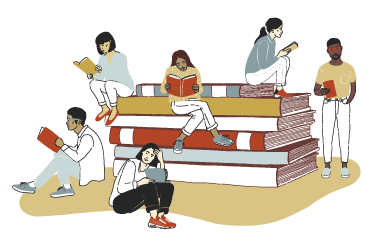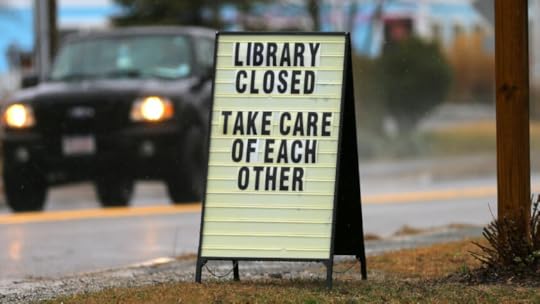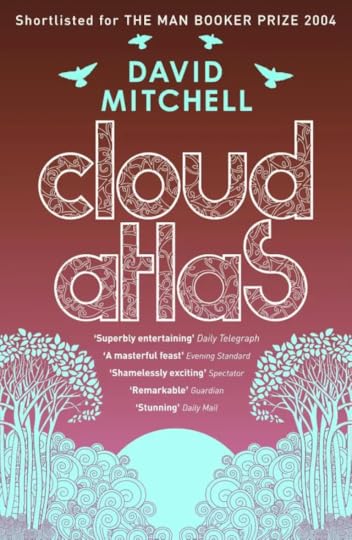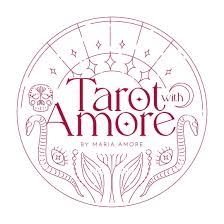Richard Harris's Blog
November 25, 2025
Do Audiobooks Count as Reading?

How I like to get my audiobook on
In a piece for The New York Times, Brian Bannon, chief librarian at the New York Public Library, answers a question I imagine many book club members worldwide have asked themselves at one time or another: “Do Audiobooks Count as Reading?”
In case you don’t have a digital subscription to the Times, I’ll highlight some of the more memorable points. Today, 41% of adults don’t believe audiobooks qualify as reading. Yet, as Bannon points out, “learning to read with the eyes starts with decoding, linking letters to sounds and meaning. But once those pathways are built, the brain draws on the same language network to make sense of words, whether they arrive through sight or sound.”
Audiobooks not only allow blind people to become “absorbed in the words, taking in their meaning,” but also assist people with dyslexia, like the author of the article, to “effortlessly absorb ideas and focus in a way I hadn’t before.”
Interestingly, listening to books is on the rise: “Audiobook sales reached about $2.2 billion in the United States last year. At the New York Public Library, audio circulation rose 65 percent in the past five years while circulation for print and e-books stayed flat — a pattern mirrored nationwide. Audio has overtaken e-books in driving growth.”
In my own book club, we 12 readers are never on the same page (groan) when it comes to how we “read” our shared literary journey every month. Although I don’t have any hard stats to back this up, I’d say we’re roughly 40% physical book, 30% e-book, and 30% audiobook. Personally, I’m around 50/50 with the physical copy and e-book (shout-out to the Toronto Public Library for having seemingly every book under the sun and free delivery of physical books to my home branch).
That being said, I do listen to the odd book now and again. In the case of Bono’s Surrender, that actually saved me. When I found myself not fully engrossed in the reading aspect of the story, I switched to the audiobook and ended up finishing it (all 845 hours . . . give or take) quite happily. In another instance, we read David Grann’s The Wager not long ago and a few of my fellow book club members swore by the audiobook, saying there was no chance they would have finished it without the euphonious voice of the man responsible for reading it to them.
On a final note, I liked loved the conclusion to the piece Brian Bannon wrote, as it essentially captures why I started a book club in the first place 16 years ago: “However we read — by eye, by ear or both — it all counts. What matters is that the words get in, the brain makes meaning and the identity of being a reader takes hold. We need more readers, however they get there.”
August 23, 2025
News Flash: Discussing Books Is Healthy

Per an article in the NYT, “Fewer People Are Reading for Fun, Study Finds“:
Researchers from University College London and the University of Florida examined national data from 2003 to 2023 and found that the share of people who reported reading for pleasure on a given day fell to 16 percent in 2023 from a peak of 28 percent in 2004 — a drop of about 40 percent. It declined around 3 percent each year over those two decades.
That’s the bad news. The good news? “People may draw particular benefits from thinking deeply about what they read and talking about it with others.” Translation: join a book club stat.
People may draw particular benefits from thinking deeply about what they read and talking about it with others.
It is not the case that “I can sit you down and give you a Jane Austen novel, you read it, and you come out with better mental health,” said James Carney, an associate professor at the London Interdisciplinary School and the lead author of a 2022 study on reading and mental health.
But discussing and reflecting on fiction — as opposed to just reading it — was linked to better mental health and social capabilities, including the ability to perceive nuances in interpersonal relationships, said Dr. Carney.
News Flash: Discussing Books is Healthy

Per an article in the NYT, “Fewer People Are Reading for Fun, Study Finds“:
Researchers from University College London and the University of Florida examined national data from 2003 to 2023 and found that the share of people who reported reading for pleasure on a given day fell to 16 percent in 2023 from a peak of 28 percent in 2004 — a drop of about 40 percent. It declined around 3 percent each year over those two decades.
That’s the bad news. The good news? “People may draw particular benefits from thinking deeply about what they read and talking about it with others.” Translation: join a book club stat.
People may draw particular benefits from thinking deeply about what they read and talking about it with others.
It is not the case that “I can sit you down and give you a Jane Austen novel, you read it, and you come out with better mental health,” said James Carney, an associate professor at the London Interdisciplinary School and the lead author of a 2022 study on reading and mental health.
But discussing and reflecting on fiction — as opposed to just reading it — was linked to better mental health and social capabilities, including the ability to perceive nuances in interpersonal relationships, said Dr. Carney.
January 31, 2025
Overused Terms and Expressions
It is what it is.
Bennett Kleinman has a piece on Word Smarts titled “Why Are These Words ‘Banished’?” that deserves a look, if not for reflection on your own vocabulary then for a laugh or two.
Personally, there is one expression and one term that drive me slightly insane in the membrane these days. The first, as you can see above, is the use of “It is what it is.” This has become a favourite go-to crutch for athletes of every ilk, it would seem, especially when deflecting attention away from a mistake or problem or criticism.
Q. “Why did you guys suck the bag so hardcore in tonight’s game?”
A. “Ah, you know, it was, like, I don’t know . . . I mean . . . It is what it is, right?”
The second, most notable in political commentary lately, is “double down.” Pundits can’t seem to get enough of its use — even when there are no cards involved!
Q. Why is the incredibly rational and balanced man trying to take over Greenland?
A. Well, he’s doubling down on his efforts to collect more ice. It started with Alaska, but that proved untenable because the former leader doubled down on global warming, so now everyone seems to want to double down on accumulating frozen water.
Perhaps another article could focus on the ridiculousness of ridiculous abbreviations used in texts and emails of late. Can we not agree that when we’ve resorted to IKWYDLS (I know what you did last summer) to simply save a few seconds of typing that we need to re-examine the whole exchange of information thing?
November 23, 2024
2024 Literary Awards for Fiction

Literary Awards Season = Lots of Gift Choices
So it’s time to start shopping for holiday novels, assuming your friends, relatives, and colleagues have the time and interest in reading fiction. If you should find yourself to be so fortunate as to have a flamboyance not of flamingos but of bibliophiles in your life, you might consider some of this year’s top literary award winners and finalists. To simplify the process, I’ve put a few of them together here for your viewing pleasure. Happy shopping — and reading!
2024 Booker Prize (Winner: Orbital by Samantha Harvey)
Shortlist: James (Percival Everett), Creation Lake (Rachel Kushner), Held (Anne Michaels), The Safekeep (Yael van der Wouden), Stone Yard Devotional (Charlotte Wood)2024 Nobel Prize for Literature (Winner: Han Kang)
Translated Works (English): The Vegetarian (2007), Greek Lessons (2011), Human Acts (2014), The White Book (2016), We Do Not Part (2021)2024 Giller Prize (Winner: Held by Anne Michaels)
Shortlist: What I Know About You (Éric Chacour), Curiosities (Anne Fleming), Prairie Edge (Conor Kerr), Peacocks of Instagram (Deepa Rajagopalan)2024 Atwood Gibson Writers’ Trust Fiction Prize (Winner: Batshit Seven by Sheung-King)
Shortlist: What I Know About You (Éric Chacour), Prairie Edge (Conor Kerr), Code Noir (Canisia Lubrin), Hi, It’s Me (Fawn Parker)2024 Governor General’s Literary Award for Fiction (Winner: Empty Spaces by Jordan Abel)
Shortlist: Code Noir (Canisia Lubrin), The Memoirs of Miss Chief Eagle Testickle: Vol. 1: A True and Exact Accounting of the History of Turtle Island (Kent Monkman, Gisèle Gordon), Her Body Among Animals (Paola Ferrante), Naniki (Oonya Kempadoo)2024 National Book Award for Fiction (Winner: James by Percival Everett)
Finalists: Ghostroots (‘Pemi Aguda), Martyr! (Kaveh Akbar), All Fours (Miranda July), My Friends (Hisham Matar)2024 Pulitzer Prize for Fiction (Winner: Night Watch by Jayne Anne Phillips)
Finalists: Same Bed Different Dreams (Ed Park), Wednesday’s Child (Yiyun Li)International Booker Prize 2024 (Winner: Kairos by Jenny Erpenbeck)
Shortlist: Not a River (Selva Almada), The Details (Ia Genberg), What I’d Rather Not Think About (Jente Posthuma), Mater 2-10 (Hwang Sok-yong), Crooked Plow (Itamar Vieira Junior)November 3, 2024
Librarians Face a Crisis of Violence and Abuse

“As libraries become public stages for social problems — homelessness, drug use, mental health — the people who work there are burning out.“
Because if we readers of the world won’t give librarians a voice, who will? Read an informative NYT article about this here.
October 13, 2024
The Nobel Prize in Literature 2024

In case you haven’t heard yet, South Korea’s Han Kang has won the Nobel Prize in Literature 2024. In a statement from the Permanent Secretary:
The Nobel Prize in Literature for 2024 is awarded to the South Korean author Han Kang,
“for her intense poetic prose that confronts historical traumas and exposes the fragility of human life”.
Perhaps best known in English for her International Booker Prize-winning novel, The Vegetarian, you can read a little bit about her — and get a few different takes — in The Guardian, The New York Times, Le Monde, and The Korea Herald.
July 9, 2024
Cloud Atlas at 20

If you read enough books, you’re bound to come across at least one author who touches your spirit in ways that rustle (or rock) your Tree of Life in a forever-poignant manner. If you’re lucky, said author will still be amongst the living. And if you’ve got destiny smiling down upon you, fate will intervene and you’ll get to meet that same author in the flesh. Such was my good fortune almost 20 years ago, when I spent a little time with the novelist David Mitchell in his adopted homeland of Ireland.
For me, it all started with the opening line of his first novel: “Who was blowing on the nape of my neck?” This was before David had achieved worldwide literary fame through Cloud Atlas (2004) and he was just finishing up his time teaching in Japan. By chance — pure, unadulterated chance — I came across a book called Ghostwritten (1999) while surfing this relatively new invention called the internet. This was also before the advent of social media, when the internet was still spelled with a capital “I,” cell phones had a neat new feature called “texting,” and email addresses were still dominated by the likes of Yahoo and Hotmail.
I mailed a handwritten letter to David’s publishing house after finishing Ghostwritten (for the first of three times) and asked if they would be kind enough to forward it to David himself. Some months later, I discovered, they had not only forwarded my letter to him, but he had replied to me — with a handwritten letter of his own. And thus our correspondence began.
To have watched his literary evolution this past quarter-century has been both mind-blowing and heart-warming: mind-blowing because you (and by “you,” I mean me) realize he’s this real-life towering figure of literature you’ve witnessed morph into a master wordsmith and purveyor of ever-more intricate plots and narrative structures over the years; heart-warming because you (again, me) know first-hand that he is not only an author who has seismically altered the bedrock of your life but also a man who is perhaps the best any of us could aspire to be: humane, empathetic, and deeply thoughtful.
This is all my prelude to marking the 20th anniversary of the publication of Cloud Atlas, one of those books that, like The Wind-Up Bird Chronicle and The Master and Margarita, turns your world on its head.
Gabrielle Zevin, of recent mega-fame from her latest novel, Tomorrow, and Tomorrow, and Tomorrow, penned a lovely homage to Cloud Atlas not long ago in The Guardian titled “Cloud Atlas at 20: What makes a novel tattoo-worthy?” If you haven’t read the book yet, Zevin gives a quick overview, but mostly it’s about recalling why for her — and so many of us — this book is so special. One part she wrote, in particular, jumped out at me when I was reading the article:
It is because Mitchell is the kind of writer we want to be, and Cloud Atlas is the kind of book we want to write. It represents the possibilities for fiction – that there are new stories and new ways to tell them, that there will be readers for these new stories if only we can manage to be as brilliant as Mitchell.
When I flew out to Ireland all those years ago, I know now that I felt very much like that at the time. I suppose my real fortune was in learning not that David Mitchell was in fact a real person, but in discovering that he is just as brilliant and engaging as his indefatigably creative works of fiction. For those of us who find comfort in the hallowed pages of literature, that was nothing less than life-affirming.
April 22, 2024
Therapeutic Tarot for the 21st Century

This is heartfelt support — not shameless promotion — for one of my nearest and dearest friends, Maria Amore, who has just launched her Tarot with Amore website. And this is no ordinary tarot card reader. Maria speaks four languages, has two degrees in law, an undergraduate degree in psychology, and is a published author and professionally trained chef. She has also travelled the world extensively and recently returned to Canada after living in Mexico for 10 years.
Per her website:
Tarot is a transcendental tool which helps us access our inner world so that we can understand ourselves, our path and our relationships on the deepest level. With this new awareness, we feel empowered to actively create the future we desire. I am here to support you, and offer you my readings for your highest good and for the highest good of everyone involved.

Maria has a variety of services she offers, whether by one-on-one live reading through video chat, text message, or a written report delivered right to your electronic door. Even if you’re just curious, don’t be shy about visiting her website. Better yet, contact her directly if you want to learn more. As Maria likes to say, “In everything, there is a gift. I always look for that gift. This guides me in my readings.”
February 12, 2024
TPL (Kinda) Back Up and (Sorta) Running

This is what you are likely to confront on your next visit to the TPL
Here’s the good news: You can take out, put holds on, and return books once again at the Toronto Public Library (TPL). Here’s the bad news: The TPL branches look like the above picture because their website is still down after some backhanded biblioclasts carried out a cyberattack on the TPL last October. Yes, you read that correctly. For the last three and a half months, the TPL has had no functioning website — and still doesn’t.
However, you can now visit a branch, let the kind and kindly librarians know of a title you are looking for (only two at a time until further notice, I was told), and then take out said title(s) for the usual three-week literary party.
In related news (i.e., my beef with the news outlets), the British Library was also the victim of a cyberattack in November 2023, and it’s online services are still down, too. I know what you’re asking yourself right now: Where’s the beef? Unfortunately, Wendy’s does not have the answer to this one.
The British Library, along with the Library of Congress in Washington, D.C., is the largest library in the world. The TPL is the largest library system in Canada and averaged a higher circulation per capita than any other public library system in 2023. And yet the news has been conspicuously lacking any news about two major events in the world of knowledge sharing and literature.
Books — and by extension libraries — may not be cool or relevant to some people in 2024, but I can assure all the people who make a living on reporting the news that there are still enough antiquated bibliophiles out there who thirst for more information on the cyberattacks to warrant greater coverage than has been made available up to now. And be careful journalists; we (wannabe) literary savants will not be easily ignored — and we carry a big bookmark.



